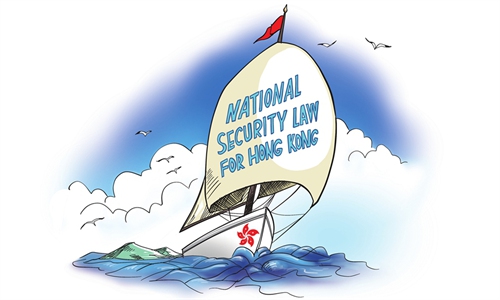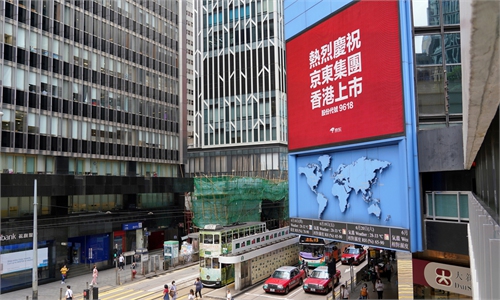
Shares of JD.com Inc begin trading in Hong Kong on June 18, 2020. Photo: cnsphoto
It seems like an enduring topic as to when Singapore will supplant China's Hong Kong Special Administrative Region (SAR) as Asia's financial hub, a topic which could always be reanimated whenever there is any update of seemingly supportive data.
An online post titled "Singapore overtakes Hong Kong as the largest foreign exchange market in Asia-Pacific" has gone viral among Chinese netizens over the past week. It said that average daily turnover of foreign exchange trading in Singapore reached $549.5 billion per day in April, making it the biggest market in Asia, while Hong Kong's daily trading volume was $524 billion during the corresponding period.
The post fueled a new round of fear-mongering over whether Hong Kong could maintain its financial center status amid growing China-US competition and rivalry.
Dubbed as the two of the Four Asian Tigers, Hong Kong and Singapore have long been locked in a race for the crown of Asia's most important financial center. Yet, with changes in the regional geopolitical landscape, it has become more common for outside observers to draw the comparison between Singapore and Hong Kong to spread pessimistic views about the latter's financial appeal and economic prospects.
But facts always speak louder than rumors. Economic data showed clearly that the market maintains strong confidence in Hong Kong's financial environment, as Hong Kong's social stability is now backed up by the National Security Law for Hong Kong. Many analysts believe the set of new laws enforced in the SAR have further consolidated Hong Kong's position as a leading international financial center.
According to the Economic Herald, during the year ended June 30 this year, the fundraising through new IPOs in the Hong Kong stock market surged to HK$517 billion ($66.5 billion), up 54 percent year-on-year. Meanwhile, the northbound and southbound trading under the Shanghai-Hong Kong and Shenzhen-Hong Kong stock connect programs rose 97 percent year-on-year and 146 percent to 110.6 billion yuan and HK$37.5 billion on a daily basis.
Despite the impact of the coronavirus pandemic, this rapid growth demonstrates that Hong Kong's financial appeal remains irreplaceable for international investors.
The biggest difference between Hong Kong and Singapore is that its development has the strong support from the giant Chinese mainland economy that is still experiencing high-speed growth rates. Despite the pandemic hit, the fact that Hong Kong's primary market still led the world in terms of IPOs over the past 12 months indicates the city's potential on the back of the Chinese mainland economy.
On August 20, the China Securities Regulatory Commission pledged in a news release that it will deepen market connectivity between the mainland and Hong Kong and firmly support the stable development of Hong Kong's capital markets. Moreover, under the 14th Five-Year Plan, the central government also pledges to support Hong Kong to enhance its status as a global offshore Renminbi trading hub.
With such strong policy support, it is conceivable that opportunities for Hong Kong will only grow, which is likely to draw envy. The Western media's perpetual yelling for investors to withdraw capital from Hong Kong should be seen for what they are - uninformed gossipmongers.



